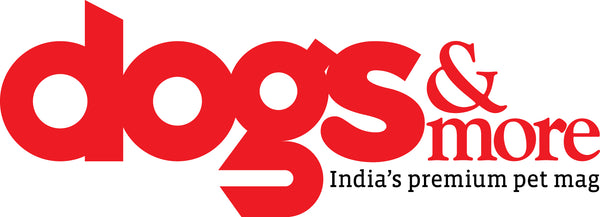If you are a pawrent to pups, you must know that puppies eat everything under the sun. From home-cooked food, table scraps, and household items to even your fingers, nothing is safe from a puppy's nibbles. Keep a bowl with any food and watch their hind legs raise into a not-so-graceful tumble as they try to finish the food before the invisible timer runs out.
Have you wondered why are they always hungry and why we have to feed them so much? Once you understand the growth stages of a dog, it’ll all make perfect sense.

“Hooman, we haven’t eaten in the last 30 seconds, feed us”
Dogs complete anywhere between 60 to 75 percent (depending on the breed of puppy) of their growth within 6 months. You can only imagine how much energy is needed to develop their body for zoomies, uncontrollable tail wags, squirrel patrol, and destroying packages.
But on a more serious note, this means that their food needs to be filled with the right ingredients to give them the necessary nutrients for healthy growth.
The easiest solution is to simply increase their food intake to satiate their hunger. But if we don’t ensure giving them the right nutrients, they will just end up being chonky and that’s not a good sign.
We would also like to get this off the plate - Do not feed your puppies food that is made for adult dogs. Contrary to belief, it doesn’t contain the necessary nutrients or the required feeding quantity.
Let us look at what nutrients growing puppies need and in what amount.
Protein
According to the Association of American Feed Control Officials (AAFCO), a growing pup needs a minimum of 22.5% of its daily food intake from protein (dry basis), compared to adults, who need around 18%. The need for protein is at its highest when a puppy is done with weaning.
So what does protein in food do for a puppy? Dogs, you see, cannot accumulate proteins in the body. This means that they need proteins every day.
This protein is responsible for
- Strong muscle development - helps build the foundations for powerful limbs and the torso.
- Building immunity - having a strong immune system at a young age makes a puppy less prone to sicknesses, infections, and diseases in the future.
- Healthy hair and skin - Protein does all the wonders those shampoo ads claim. “Silky hair as well as smooth skin, get your puppy looking expensive with the right protein”
Now, what is ‘good’ protein? We tend to think that all parts of meat are full of protein. But the best sources of protein from meat come from the thigh portions, bone meat, and organs (liver, heart, kidney). You can give them chicken and fish as well.
In the vegetarian section, grains (jowar, ragi, flour) and oilseeds (flaxseeds, soya) help your puppy grow up healthy.
Fat
A puppy needs a minimum of 8.5% fat in their daily meals. In the right amounts, it’s a great booster for healthy puppy growth.
Fat content in food is responsible for
- Energising the puppies.
- It also contains fatty acids that boost overall development.
- The fat content also acts as a cab driver to transfer fat-soluble vitamins into the body.
Some good sources of fat include fat from chicken, eggs, fish oils, and certain vegetable oils like sunflower and coconut oils. Make sure to use the right amount of fats, as an excess of anything, has the same repercussions as it does in humans.
Carbohydrates
While there is no specified number, puppies need around 50%-60% of carbs in their diet. It is something that a puppy needs to be a ‘puppy.’
It works along with fats as the main source of
- Energizing a puppy. It is the fuel for their adventurous journey to climb the highest sofa, crawl below the cabinet, and hide inside the laundry basket.
- Carbohydrates are easily converted into glucose ensuring that a puppy’s brain and nervous system are working well.
- They contain necessary fibers that help in healthy digestion.
- They are useful in avoiding tartar accumulation in the teeth so that the puppy’s chompers are always in good condition.
Excellent sources of carbohydrates include rice, vegetables like pumpkin, and fruits like papaya, barley, potato, corn, and oats! Keep an eye on the carbs, or the puppies will end up with pot bellies.
Vitamins & Minerals
A puppy requires certain vitamins and minerals that are highly essential. Here’s a list:
|
Vitamins |
Minerals |
|---|---|
|
Vitamin A |
Phosphorus |
|
Vitamin B complex |
Calcium |
|
Vitamin C |
Sodium |
|
Vitamin D |
Magnesium |
|
Vitamin E |
Potassium |
|
Vitamin K |
Chloride |
|
Choline |
Sulfur |
No meal can be considered ‘balanced ‘ if it doesn’t have the right vitamins and minerals.
- A puppy’s body has many functions that are carried out through chemical responses. Vitamins and minerals ensure these responses are smooth so that the puppy grows healthy bones, has a smart brain, and its body functions normally.
- Vitamins aid in proper cell growth, blood clotting, metabolism, eyesight, liver, and brain functions.
Yucca extract, carrots, papaya, pumpkin, cumin seeds, and fish oils are a few sources of these vital nutrients.
Water
Water, the elixir of life is essential for puppies. They drink much more water than adult dogs do because their body needs it as they are growing at a fast pace. Puppies need water based on their weight, ranging from 60 milliliters to over a liter (Varying in different seasons). Dehydration is a serious issue in pets and can lead to unnecessary complications for the little one.
Water helps
- Regulate body temperature.
- Blood flow.
- Metabolism.
Keep a bowl of water for your puppies at all times and make sure to change the water after a certain time to avoid contamination.
Sometimes puppies may not drink enough water, so it is important to compensate by adding water to their food. Some commercial puppy foods also have high moisture content.

Now that we’ve seen all these important nutrients that a puppy needs, here are some points to note in terms of their nutrition.
- Sometimes puppies just need to chew something because teething causes itchy gums. Chewing is the only way for them to relieve the pain and discomfort. It’s advisable to give them chew toys, carrots and other puppy safe food to encourage healthy teeth growth.
- Let's start with a special fact. Did you know some Labradors carry a gene that doesn’t allow their brain to recognize the feeling of being full?
- Puppies may always be hungry and it’s good to feed them. But make sure to stick to the prescribed feeding quantity from vets.
Here’s a general feeding guideline per day for puppies depending on age -
- 2 to 3 months old - Four meals
- 3 to 6 months - Three meals
- 6 to 12 months (up to 24 months depending on breed) - Two meals

“Sharon, I’m done with you denying me my eighth meal. I’m outta here”
- When introducing solid foods to puppies, we suggest softening them by adding water. This helps pups adjust to a new form of food.
- They need the best nutrients at this tender yet crucial age of growth, so make sure you read the label of puppy foods to see that they are getting only the best. If you’re struggling with maneuvering through labels, you can check this blog for reference.
- Their hunger can be advantageous for you to train them! You don’t need special treats. Reward them with food.
- Finally, just as it is in everything pet-related, give them your time, company and the right nutrition.
Team Wiggles has started an initiative called #BondedByBlood through which we are trying to create an online repository of ready pet blood donors. Register your pet today and save a life tomorrow.
*Disclaimer: This blog is vet-approved and includes original content which is compiled after thorough research and authenticity by our in-house team of vets and content experts. It is always advisable to consult a veterinarian before you try any products, pet food/treats, or any kind of treatment/medicines on your pets, as each pet is unique and will respond differently.



















